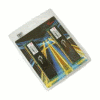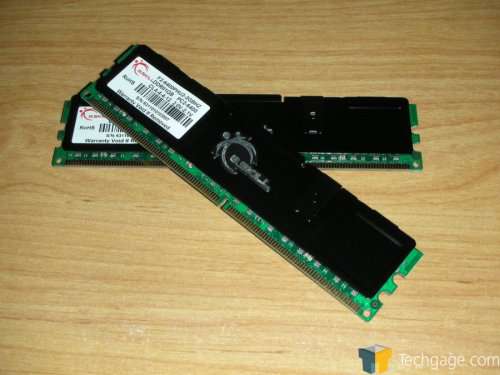- Qualcomm Launches Snapdragon 4 Gen 2 Mobile Platform
- AMD Launches Ryzen PRO 7000 Series Mobile & Desktop Platform
- Intel Launches Sleek Single-Slot Arc Pro A60 Workstation Graphics Card
- NVIDIA Announces Latest Ada Lovelace Additions: GeForce RTX 4060 Ti & RTX 4060
- Maxon Redshift With AMD Radeon GPU Rendering Support Now Available
G. Skill 2GB F2-6400PHU2-2GBHZ

If you are in the market for a memory kit that offers great overclocking ability along with an ideal price, then G. Skill may have you covered. Equipped with the amazing Micron GMH chips, these modules have some pushing power.
Page 2 – Overclocking Ability
Like many other performance modules out there today, the 2GBHZ use Micron D9GMH chips, which are binned for 333MHz 3ns. These chips are favored by numerous memory companies, due to the fact that they are much cheaper than it’s big brother, the D9GKX, but still offer insane clocking potential. We first saw these chips being widely used in Corsairs 1GB PC2-8500 kit, so it was evident that these chips were gold.
These modules are on par with other PC2-6400 performance kits out there, thanks to it’s 4-4-4 timing set. Some companies recently have been throwing a tRP 3 in there, but that doesn’t make a huge difference in the grand scheme of things. What’s also nice to see is the stock voltage… 2.0v/2.1v is not a bad requirement at all. No doubt most out there will have no issues with 2.0v though, or even 1.9v for that matter.
Because of the chips being used, I somewhat had an idea of what to expect in terms of overclocking potential. I was thrown off though, as I wasn’t able to push them as far as I had originally hoped. I will get more into this shortly though. Here are my overclocks:
- DDR2-800 4-4-4-12 1.9v 1T (2.40GHz 1.25v)
- DDR2-900 4-4-3-12 2.1v 2T (2.70GHz 1.45v)
- DDR2-1000 4-4-4-12 2.3v 2T (2.50GHZ, 1.4v)
- DDR2-1040 4-4-4-15 2.4v 2T (2.6GHz, 1.45v) (96% Stable)
- DDR2-1100 5-5-5-15 2.45v 2T (2.75GHz, 1.45v) (98% Stable)
To test for stability, I used MemTest for Windows, which does an awesome job of detecting errors quickly. I find that it’s far more accurate then the standard DOS version most people use. That aside though, you will notice that I declared the final two overclocks not as 100% stable. I determined 96% and 98% because after a 500% run on MemTest for Windows, that was the average I was left with. Personally, I would be completely comfortable at either setting, but some may not be.
As I mentioned, I expected a wee bit more out of these, but I am still pleased with the results. For the average $240US price, being able to hit DDR2-1100 as such is impressive. $40 less and you usually get stuck with a value kit that barely inches away from stock. This is what I like to see. I had wanted to hit the theoretical ‘max’ overclock with these modules, which is 570MHz (can’t go higher due to CPU), but was unable. At that point, they were more like 5% stable, even with 2.5v.
Some people around the interweb are doing better than I am with their kits, so it could be I got a less than ideal set. Chances are your may be better, or even worse. Hard to tell. But with GMH chips, you have a far better chance of a success rate. Yes, I love these chips if you can’t tell. In the words of Depeche Mode… “I just can’t get enough”. Ok, you’ve had enough, I can tell. Let’s move onto our benchmarking methodology and then our reports!
Throughout all of our benchmarks regardless of what we are reviewing, testing is done in a clean and stand-alone version of Windows XP Professional with SP2. Prior to testing, these conditions are met:
- Desktop and scrap files are cleaned up, including emptying of recycle bin.
- No virus scanner or firewall is installed in the stand-alone installation.
- The stand-alone installation drive is completely defragged using Diskeeper 10 Pro Premier.
- All unnecessary programs are closed, so that Windows should have no more than 15 active processes running.
- Computer has proper airflow.
If you are interested in using the same benchmarks as us, feel free to visit the developers website:
The testing rig used for today’s benchmarking is as follows:
- CPU: AMD Windsor 4600+ EE @ 2.4GHz – 2.85GHz
- Motherboard: ASUS M2N32-SLI Deluxe (701 BIOS)
- Memory: G. Skill 2GB F2-6400PHU2-2GBHZ
- Video: BFG 6800GT OC 256MB PCI-E
- Sound: Onboard HD Audio
- Storage: Seagate 7200.9 320GB
- Etcetera: Windows XP Professional w/ SP2, NVIDIA 81.98 Drivers
- Cooling: Corsair Nautilus 500
For comparison, I will be pairing the PHU2-2GBHZ against the recently reviewed OCZ VX2, a kit that retails for $200 more. This is going to be fun :-)
|
|
Support our efforts! With ad revenue at an all-time low for written websites, we're relying more than ever on reader support to help us continue putting so much effort into this type of content. You can support us by becoming a Patron, or by using our Amazon shopping affiliate links listed through our articles. Thanks for your support!






